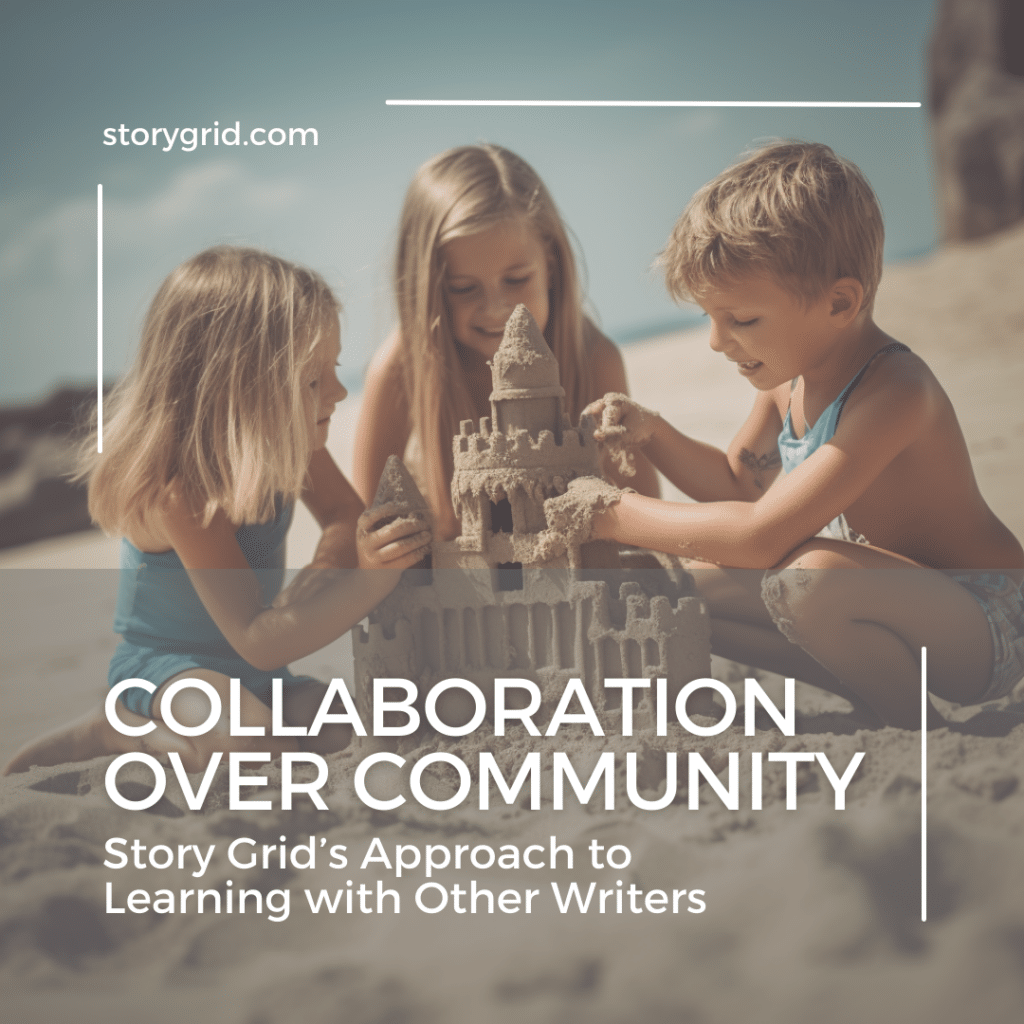At Story Grid, we have constantly evolved our training programs, making them increasingly engaging and interactive. We understand that writing, by nature, can be a solitary journey and learning the Story Grid methodology can be enriched by companionship. Over the years, we’ve seen our students express a strong desire for interaction with fellow writers, seeking support and mutual understanding of the concepts.
However, as we’ve adapted to these needs, we’ve discovered an important distinction – the difference between community and collaboration. It’s become clear that focusing more on fostering collaboration rather than just building a community can significantly enhance the learning experience and outcome for our writers.
In this article, we’ll delve into this difference, revealing why collaboration is a more powerful tool in driving achievement and success.

Community Versus Collaboration
A community is a group of individuals who unite around a common interest, goal, or geographical location. The essence of a community is to offer a sense of belonging, mutual support, and shared identity. Members of a community interact mainly for socialization, sharing experiences or information, or simply enjoying a shared interest.
On the other hand, collaboration refers to the active process of working together to produce or create something. In a collaborative setting, the interaction is more focused, primarily goal-oriented. Collaborators combine their diverse skill sets, perspectives, and resources to accomplish a specific outcome, often impossible to achieve individually.
The Dichotomy
While both community and collaboration offer unique benefits, when it comes to leveling up our craft as writers, collaboration is a much more powerful tool for several reasons.
1. Purpose-Driven Action
In a community, the primary purpose is to offer a sense of belonging and mutual support. While this shared emotional and informational support can be vital for personal and professional growth, it doesn’t always lead to tangible results. Members might unite for the joy of shared interests or the comfort of shared identities, but concrete accomplishments are not necessarily the focus.
In contrast, collaboration is purposefully goal oriented by design. It’s about combining various talents and expertise to achieve a specific outcome or solve a particular problem. The focus on a worthy goal drives participants towards active contribution, making collaboration an essential tool for reaching concrete objectives.
2. Concrete Outcomes
The outcomes of a community are often intangible and continuous – a sense of belonging, knowledge enhancement, or stronger social connections. Although these outcomes can have a beneficial and enriching influence, they may not always translate into concrete results that contribute to our success in writing a story readers love.
Collaboration, on the other hand, naturally lends itself to explicit and measurable results. Whether it’s a completed project, a produced product, or a solved problem, the outcomes of a collaboration are tangible and quantifiable. In Story Grid, we have well-defined benchmarks for our writing, enabling a small group to work effectively towards achieving these goals.
3. Accountability and Involvement
Within a community, active involvement is not always mandatory. Members can choose to be passive participants, enjoying the benefits of belonging and shared resources without making any active contributions. This can make it harder to drive specific results within a community setting.
In a collaboration, each participant usually has a specific role or task. This not only ensures a higher degree of accountability but also promotes active involvement. With everyone focused on their responsibilities, the shared goal becomes more achievable. This active participation fosters efficiency and accelerates the process of achieving the shared goal.
Collaboration at Story Grid
Although both community and collaboration have unique benefits, collaboration proves to be a more powerful tool for honing our craft as writers for several reasons. Collaboration, with its focused, active, and goal-oriented nature, often paves a more effective path toward tangible results.
At Story Grid, we encourage you not just to seek solace in a large community of writers but to take it a step further. We recommend forming or joining small, dynamic groups that collaborate throughout the learning process. This approach allows you to define precise goals and work cohesively to meet them, effectively enhancing your learning experience and writing accomplishments.